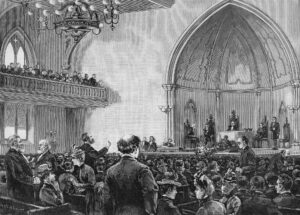Love and moral judgments
I do not know who first coined the term “unconditional love”, but I do know who popularized it—Carl Rogers (1902-1987). He was a therapist/counsellor and his approach is often referred to as Rogerian counselling/therapy. It was immensely influential. Rogers developed the idea of unconditional love to separate “love” from “moral judgements”. In other words, to truly love, you need to separate love from “the good,” our beliefs about what is right and wrong. We need to show unconditional love, with no moral judgement. To make any moral judgment means you are not loving unconditionally.
Thinking and living are not completely imprisoned and determined by language, but the words we use and the ideas we believe are very important as to how we think and live. One of the reasons modern Christians, including evangelicals, have problems thinking through many contemporary moral issues is because we believe that God loves the person unconditionally, so we should love them unconditionally.
Unfailing love
A better expression is “unfailing love”. Think about God; He is pure, unfailing love. But He is also pure, unfailing goodness, justice, truth, mercy. There is no tension in God in this. He never has to choose between love and goodness. He is always only love; always only good; always only just. His love is unfailing, nothing can stop God from being love and loving, but His love it is not separate from His goodness, so His love is not unconditional.
if you go back and read the end of Ephesians 4 and the beginning of Ephesians 5, you will see that it is because the triune God loves us unfailingly (not unconditionally) that Jesus came to save us. The Lord saw that my mind was darkened; my will was bound; I did much wrong and habitually failed to do what is right; my sexuality and identity were bent; I gave myself to idols; and I could not help or save myself. God did not say, “Oh well, who cares about justice and the wrong he has done, I love George unconditionally.“ No. “In love He came and sought me”. “In my place condemned He stood”. Perfect love. Perfect justice. Perfect mercy. The Gospel.
























